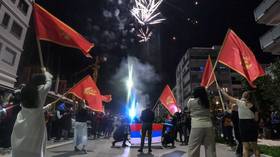Longtime leader of NATO country loses power

Voters in the former Yugoslav republic of Montenegro overwhelmingly favored challenger Jakov Milatovic over the incumbent Milo Djukanovic in Sunday’s runoff presidential election, closing a 33-year-long chapter in the small Balkan country’s history.
Djukanovic, 61, appeared on the political scene in 1989, taking part in a coup within the Communist party. He has dominated Montenegrin politics in one way or another since 1991 – as prime minister, president, and head of the Democratic Party of Socialists (DPS). He conceded on Sunday evening, after preliminary results showed Milatovic getting at least 57% of the vote, with a 70% turnout. Montenegro’s total population is about 600,000.
“Tonight is the night we have been waiting for over 30 years,” Milatovic told supporters in the victory speech. He vowed to get Montenegro full EU membership within five years, and that Montenegro would “never again” fuel tensions with any of its neighbors.
Milatovic, 36, was an economic minister in a previous cabinet, who joked on the campaign trail that he was in kindergarten when Djukanovic first came to power. He campaigned under the slogan “We shall succeed together,” hammering the incumbent for stoking ethnic and religious tensions, as well as on economic failures.
Djukanovic’s slogan was ‘Milo, who else’? He accused Milatovic of representing the “politics of Greater Serbian nationalism” and claimed Montenegro was threatened by neighboring Serbia and “malign Russian influence.”
For centuries, Montenegro considered itself a Serbian, Orthodox principality with close ties to Imperial Russia. Djukanovic sought to build a new, anti-Serbian and anti-Russian national identity, with a separate church and language. He cited a “Russian-backed coup” attempt – that turned out to be unsubstantiated – to get Montenegro into NATO without a referendum. The DPS lost the parliamentary election in 2020 after an unsuccessful attempt to seize Serbian Orthodox Church property.
Getting high-profile endorsements from Bosniak and Albanian politicians did not translate into a turnout for Djukanovic in minority strongholds. His hometown of Niksic went overwhelmingly for Milatovic.
“We waited for this great victory of the people for 30 years,” Niksic mayor Marko Kovacevic told RT Balkans on Sunday evening. “Starting tomorrow, Montenegro will be different, because Milo is not in any position of power anymore.”
Technically, Djukanovic’s mandate expires on May 21, when Milatovic is supposed to be inaugurated. The political coalition backing him will face a new test at the special parliamentary election scheduled for June 12.













